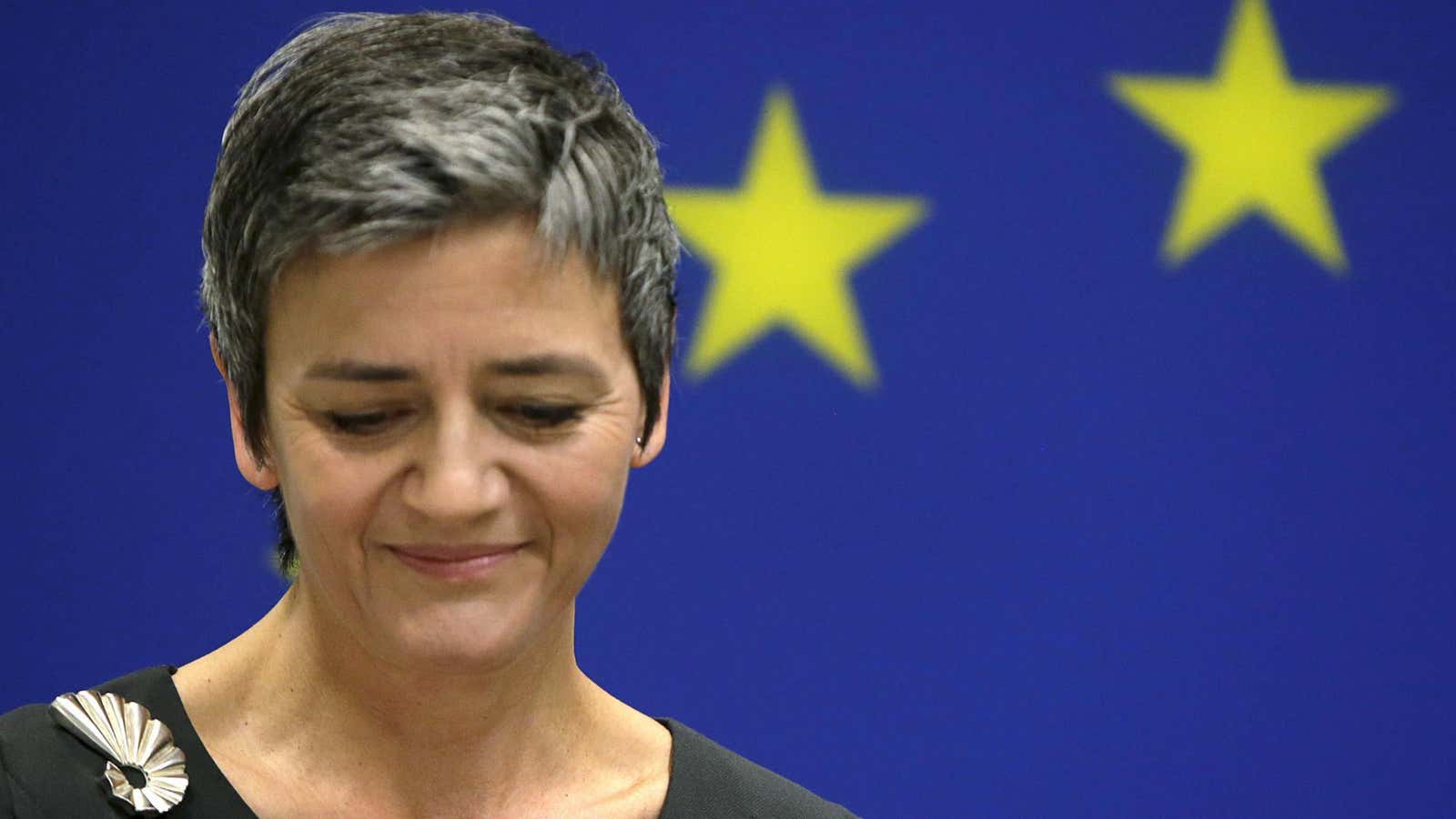One year ago yesterday, Margrethe Vestager went to Horsens, a tiny Danish town of just over 50,000 people, on a trip to a care home to understand the nutritional requirements of its elderly residents.
A year later, she was in Brussels, standing before the world’s press at the European Commission’s daily briefing and accusing Russian giant Gazprom of engaging in anti-competitive practices. Her announcement yesterday (April 22) was a strong followup to her appearance in the same spot one week earlier, when she notified the world that she was formally charging Google with abusing its dominant position in search.
The flight from Copenhagen to Brussels may be a short one but the distance Vestager has traveled from her old job in Danish government to her new one as Europe’s top antitrust cop is enormous. From 2011 to 2014, when she was Denmark’s deputy prime minister and minister of the economy and the interior, her influence was largely concentrated in one country. Now it stretches across Europe—and arguably much farther than that, as her most recent pronouncements reverberate from Silicon Valley to the Kremlin.
Billions at stake
Vestager’s job with the European Commission, the EU’s executive arm, was always going to be a high-profile role. Commission president Jean-Claude Juncker had all but guaranteed important positions to female commissioners.
As competition commissioner, Vestager wields powers that the other 27 commissioners can only dream of.
“Competition investigations are the teeth of the Commission,” says John Phelan of BEUC, a Brussels-based umbrella body for European consumer organizations. “It’s the one area in which they have the remit to enforce their policy.”
In antitrust cases like the ones brought against Google and Gazprom, the EU could fine the companies up to 10% of their global annual revenue. If the commission prevails against Gazprom, it theoretically could collect up to $10.7 billion in penalties, in addition to forcing the state-owned company to make room for competitors in markets where it has gone virtually unchallenged.
Google is facing a maximum penalty of roughly $6 billion. Many consider this outcome unlikely, as the commission typically doesn’t extract the full penalty allowed. More worrying for Google, the commission could require the search giant to change the way it does business, and establish precedent for other areas it might choose to investigate, beyond the market for shopping searches.
The apolitical politician
That Vestager brought charges against Google within her first few months in office was not a huge surprise. The case was in Vestager’s inbox when she took the job. Her predecessor, Joaquín Almunia, had opened an investigation into Google in 2010. But after five years, three failed settlement attempts were all he had to show for his efforts.
By the time Vestager came along, the case had taken on a political hue in Europe. After she announced the formal complaint, reaction in the United States was similarly charged. Many Americans saw the Google case as baseless, protectionist, and a direct attack on the US. But Vestager played down these concerns, telling USA Today, ”As one of my daughters said to me: I don’t think about Google as an American company instead of a European company, I just like the services they can give me.”
Some Brussels insiders suggest the charges provide some well-timed damage control in the wake of inflammatory statements by EU digital commissioner Gunther Oettinger, who recently suggested that the EU, beyond monitoring for antitrust breaches, should aggressively regulate established US internet companies to reduce their dominance in Europe. Bringing the charges now—as the EU prepares to lay out its strategy for a unified approach to the region’s digital economy—allows Vestager to signal to her colleagues, ”Don’t worry, I’ve got this, let’s take it easy on the regulation talk.”
Another note on the timing of the April 15 announcement of the charges: it coincided with a trip Vestager made to the US. Apparently that’s how she wanted things to unfold, so that she could address the fallout directly and have concrete things to say on her visit rather than empty soundbites. These are hallmarks of a good bureaucrat, yes, but also a sophisticated politician.




